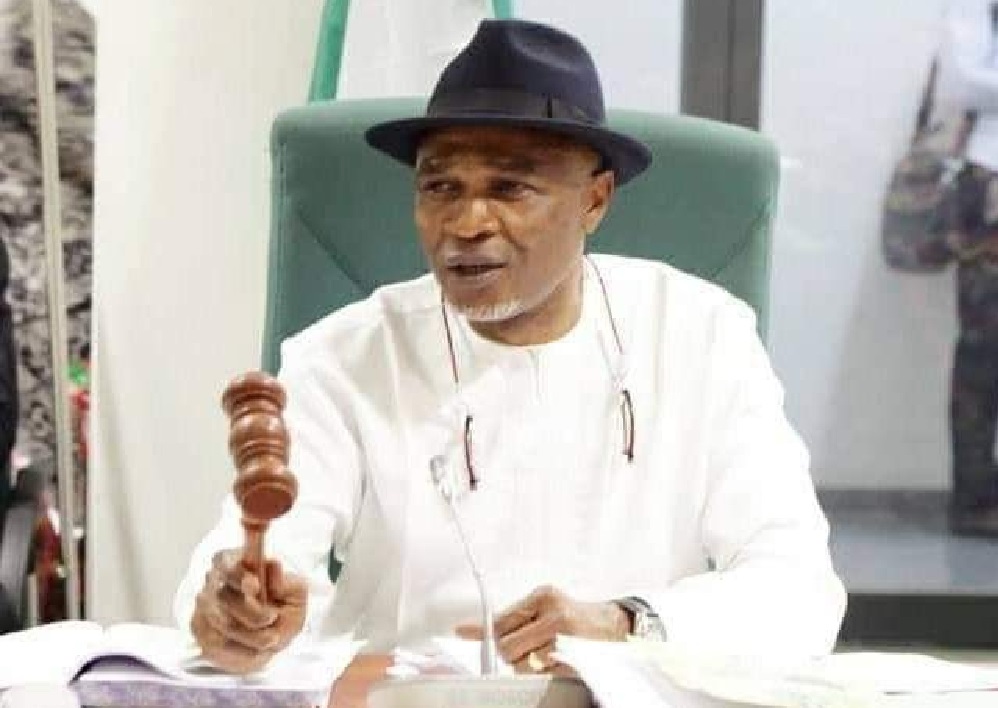News
Abiodun Presents N1.054trn Appropriation Bill To Ogun State House Of Assembly

Ogun State Governor, Prince Dapo Abiodun, has presented a total of N1,054,542,020,147.47 to the State House of Assembly as the State’s proposed budget for 2025.
Speaking at the Assembly’s Complex, Oke-Mosan, Abeokuta, Governor Abiodun said the budget, tagged “Budget of Hope and Prosperity,” is made up of N453.56 billion as recurrent expenditure and N600.98 billion as capital expenditures.
Giving highlights of the appropriation, the governor said N120.1 billion would go for personnel costs, N37.49 billion for consolidated revenue cost, public debt charges would gulp N76.07 billion, while N219.86 billion would be spent on overhead costs.
On some of the key physical capital projects that would be executed in the 2025 budget, Abiodun listed the renovation of general and state hospitals and the purchase of laboratory and medical equipment across the state, revitalization of 80 primary health centers, and procurement of laboratory and medical equipment across all primary health facilities in the state, as well as the construction of roads across the state.
Other projects include the procurement and energizing of transformers, construction of fire stations across the state, upgrading of rural roads across the state, extension of the Redline Metro Rail from Agbado to Kajola, Blueline Metro Rail from Okokomaiko-Agbara/Lusada, and the Purpleline Metro Rail line.
He said the government would also embark on the construction of the Ogun Lodge Government House in Abuja, rehabilitate 150 km of feeder roads across the state, construct the OGIRS Revenue House, and a modern Court of Appeal in the state.
On the funding of the 2025 budget, Governor Abiodun said an estimated N120.97 billion would come from the State Internal Revenue Service, N193.85 billion from Ministries, Departments, and Agencies (MDAs), totaling N314.82 billion.
Statutory allocations from the Federal Government, including Value Added Tax, are projected at N228.06 billion, while capital receipts comprising internal and external loans as well as grants and aids are estimated at N472.66 billion.
Giving a sectoral rundown of the budget, the governor said education would gulp N117.83 billion (17%), health N134.538 billion (13%), housing and community development N66.382 billion (6%), agriculture and industry N65.387 billion (6%), infrastructure N284.456 billion (27%), recreation, culture, and religion N25.27 billion (2%), social protection N39.836 billion (4%), general public service – executive organ N46.863 billion (4%), general public service – (financial & fiscal affairs) N42.284 billion.
He said: “We will continue to accord priority attention to the completion of ongoing projects across the ISEYA development pillars; projects with revenue potentials; projects that enhance employment generation; projects consistent with priorities articulated in the State Economic Development Plan & Strategy 2021 – 2025.
“Projects that align with the seven thematic areas contained in the Medium-Term National Development Plan 2021-2025, namely: Economic Growth and Development; Infrastructure; Public Administration (Governance, Security, and International Relations); Human Capital Development; Social Development; Regional Development; Plan Implementation, Communication, Financing, Monitoring, and Evaluation,” the governor noted.
Giving a review of the 2024 budget, Governor Abiodun said the state had achieved 79% of its pro-rated revenue target and 56% of its pro-rated expenditure target as of September 30, emphasizing that the performance over the past few years underscores the state’s fiscal reliability.
“Our internally generated revenue capacity remains commendable among sub-national entities. We will continue to leverage existing statutes to enhance revenue transparency, broaden the base, and strengthen the state’s finances without imposing additional burdens on residents,” the governor assured.
In his opening remarks, the Speaker of the House of Assembly, Rt. Hon. Oludaisi Elemide, spoke on the need to grant autonomy to the legislature, increase the running cost, provision of official vehicles for the Clerk and other officers, as well as funds for the execution of constituency projects.
He said the Assembly in the last year considered 14 bills, of which nine were passed, while 32 motions were passed into resolutions, adding that the Assembly also ensured that funds meant for projects were judiciously used by Ministries, Departments, and Agencies of government through oversight functions
News
Reps Minority Caucus decries incessant tanker fire explosions, call for decisive actions to avert future occurrences

Following the twin tanker fire explosions which occurred last weekend in Ibadan, Oyo state, and Akwanga, Nasarawa state, the Minority Caucus in the House of Representatives expressed shock and sadness over the unfortunate incidents.
The Reps Minority Caucus made this disclosure in a statement jointly signed by leaders of the caucus: Rep. O.K Chinda
(Minority Leader) Rt. Hon. Dr. Ali Isa J.C (Minority Whip) Rt. Hon. Aliyu Madaki (Deputy Minority Leader) Rt. Hon. George Ozodinobi
(Deputy Minority Whip) on Monday stating that:
“Thankfully, no lives were lost at the two avoidable incidents. But it is painful that an unspecified number of vehicles, shops, motorcycles, and other properties worth hundreds of million naira were lost; particularly at the Ibadan incident.
“It is more worrisome that this is coming at a time that the economic hardship is approaching it’s zenith in Nigeria.
The Caucus recalls that after the January tanker fire explosion in Niger state, where lives of Nigerians and humongous properties were lost, it called on the Federal Government for necessary actions.
“Happily, the government resolved to ban fuel tankers with capacities exceeding 60,000 litres of petroleum motor spirit (popularly called petrol) from operating on Nigerian roads with effect from March 1, 2025.
“However, it is disheartening that, from reports across the country, many fuel tankers are yet to comply with the directive. More ludicrous is that the Nigerian Midstream and Downstream Petroleum Regulatory Authority (NMDPRA) responsible for enforcing the regulation is yet to comply with the presidential directive; about six weeks after the kick-off date.
Apparently disturbed about the frequency of tanker explosions across the country; almost becoming permanent fixtures on challenges bedeviling Nigeria, and the damaging effects on our people, the environment, and national development, the Caucus strongly calls for deliberate and decisive actions to stem the same by the bud.
” We call on the federal government for more pro-active measures that will not only avert future occurrences but stop tanker explosions in the country.
“From reports, the Ibadan incident happened as the driver encountered difficulties navigating deteriorated portions of the Toll Gate end of the Lagos-Ibadan expressway.
“Given the deplorable state of this road, and similar others, the Caucus urges the Federal Roads Maintenance Agency (FERMA) to carry out immediate rehabilitation works on these roads.
“The Caucus shall initiate, collaborate, and pursue every legislative action that will secure the safety of our people, and properties; which is the main purpose of government.
News
Don’t sabotage war on terrorism, NEYGA warns, lauds DSS

By Francesca Hangeior
The Northern Ethnic Youth Group Assembly (NEYGA) has cautioned against actions that could undermine Nigeria’s fight against terrorism, expressing concern over what it described as an emerging campaign to discredit the Department of State Services (DSS) and weaken public confidence in the agency.
In a statement issued Tuesday in Abuja, NEYGA spokesperson Ibrahim Dan-Musa commended the DSS for its vital role in ensuring national stability and combating banditry and terrorism.
Dan-Musa dismissed recent reports allegedly from unidentified local hunters accusing DSS operatives of misusing advanced telephone tracking technology, describing them as baseless and part of a smear campaign.
“The reports claimed that the technology, meant to aid in the rescue of kidnap victims, was instead being used by some operatives to extort money from criminals in exchange for concealing their locations.
“While we do not, and certainly cannot, speak officially for the DSS, we must state without fear of contradiction that such stories were fabricated to tarnish the agency’s image.
“We are not surprised that this falsehood is being spread by the same self-styled activist who falsely accused the DSS of abducting civil rights activist, Comrade Usman Okai Austin, to serve certain political interests. Comrade Austin has since disowned the said activist and publicly apologized for his unfounded allegations against the northern governor.”
The group also recalled how the same “activist,” in a viral video, falsely accused the DSS of invading the Federal High Court on the day the Economic and Financial Crimes Commission (EFCC) arraigned former Governor Yahaya Bello.
“It turned out that no DSS operative was anywhere near the court on the said day,” the group pointed out.
“We cannot thank President Bola Tinubu enough for appointing a thoroughbred professional like Mr. Tosin Ajayi as Director General of the DSS. From the agency’s remarkable exploits since Ajayi assumed office, we are proud to say that President Tinubu made an excellent choice.
“We in the North are particularly pleased with the relentless efforts of the DSS to make the North and the rest of Nigeria safer. Very recently, Governors Dauda Lawal of Zamfara and Ahmadu Fintiri of Adamawa publicly praised the DSS—not only for seizing large caches of arms and arresting or neutralizing scores of bandits and kidnappers, but also for securing the release of kidnapped Roman Catholic priests,” the group said.
“All of these achievements poke holes in the tissue of lies being peddled by the self-styled activist,” it stressed.
The group further highlighted an incident from 2018, when a court awarded ₦10 million in damages against the DSS over the 2016 accidental shooting in Bauchi of a businessman originally from Sokoto.
“No Director General agreed to pay the compensation until Tosin Ajayi came into office. Not only did he pay the ₦10 million, he doubled the amount. Nothing could be more humane. We deeply commend DG Ajayi for that,” the group said.
NEYGA also recalled recent public apologies issued by several media outlets for falsely reporting that the DSS stormed the Lagos State House of Assembly.
“The DSS’s acceptance of the apologies and decision to drop charges against the media houses is a sign of civility by the secret police, which we wholeheartedly commend,” the group added.
“We had imagined that, as a serial contestant for the office of President, this activist would be more circumspect, lie less, and demonstrate greater patriotism in the way he speaks about Nigeria—especially if, by some chance, he ends up occupying the nation’s highest office one day. Sadly, that has not been the case,” NEYGA said.
“We commend the maturity of the DSS leadership for enduring the barrage of lies constantly thrown at it by these so-called activists. Nigerians have seen through their antics and know they do not mean well for our beloved country.
“We urge the DSS not to be distracted by these merchants of falsehood and to remain steadfast on the path of making Nigeria safer,” the group said.
News
Insecurity: PDP raises alarm over ceaseless killings in Nigeria

* Urges Aiyedatiwa to be proactive in his duties
By Francesca Hangeior
The Peoples Democratic Party (PDP) in Ondo State has urged Gov. Lucky Aiyedatiwa to be alive to his duties of safeguarding the lives and property of residents of the state.
The party’s Director of Media and Publicity in the state, Mr Leye Igbabo, stated this in a statement issued on Tuesday in Akure.
Igbabo said that the party was alarmed by the alleged ceaseless killings of hapless residents of the state by gunmen.
He said that victims of such killings were lawfully engaging in their daily activities needed to bring food to their tables.
“The party cannot, in all honesty, find reasons why such assailants could operate without any form of resistance for months running, in a state where there is said to be a valid government in place.
“Gov. Aiyedatiwa has indeed failed in his constitutional duty as enshrined in Section 14(2)(b) of the 1999 Constitution (as amended), in that he can no longer secure and protect lives and property of citizens of Ondo State.
“It is heart-wrenching to note that in less than one month, about 50 persons have been gruesomely massacred in various settlements within the state,” he said.
Igbabo expressed concerned that no arrest or prosecution had been made in the wake of these incidents.
He said that the party had been wondering if a government still exists in the state in the face of what he described as unprovoked and unrestrained killings.
“These killings are one too many and indicative of helplessness, hopelessness and huge compromise of those in the corridor of power in Ondo State,” he stated.
Igbabo urged President Bola Tinubu to urgently address the situation, as it appeared that the state government was incapacitated in tackling the menace.
-

 News7 hours ago
News7 hours agoSHOCKING! One month after giving birth, woman discovers another baby in her womb
-

 News7 hours ago
News7 hours agoTears, anguish as Plateau Community buries 51 killed by bandits
-

 News13 hours ago
News13 hours agoPeter Obi speaks as Benue govt. blocks humanitarian visit
-

 News7 hours ago
News7 hours agoAngry investors raid CBEX office, loot assets in Ibadan after digital Platform crash
-

 News14 hours ago
News14 hours agoFUOYE VC suspended over sexual harassment allegations
-

 News7 hours ago
News7 hours ago‘Not something I’d wish on anyone’ — Melinda Gates opens up on divorce
-

 Politics7 hours ago
Politics7 hours agoIgbo Youths Set To Mobilize 5 Million Man-March In Support Of Tinubu, Kalu
-

 News14 hours ago
News14 hours agoPower Generation Companies Express Concern Over N4 Trillion Unpaid debts, Warn Imminent Shutdown


















